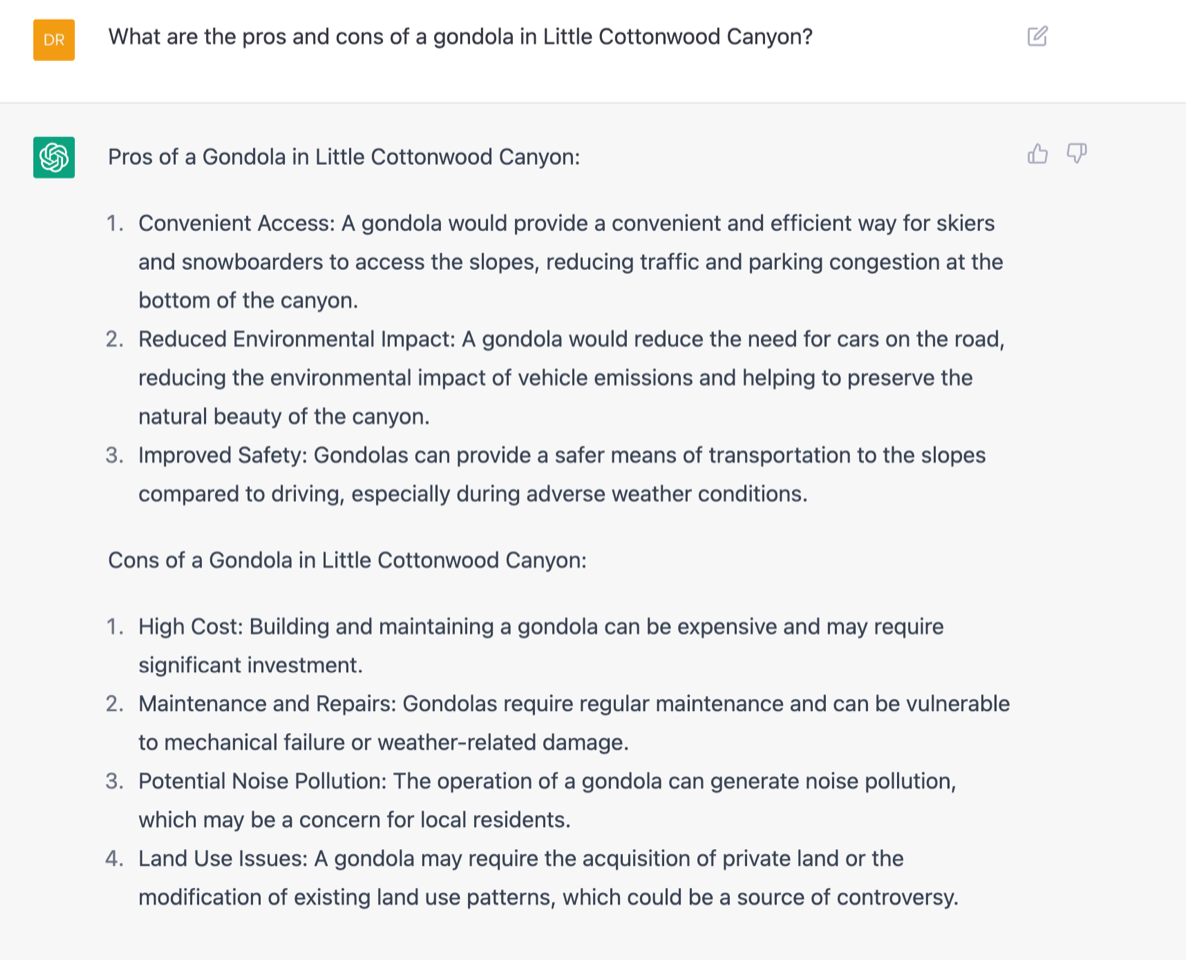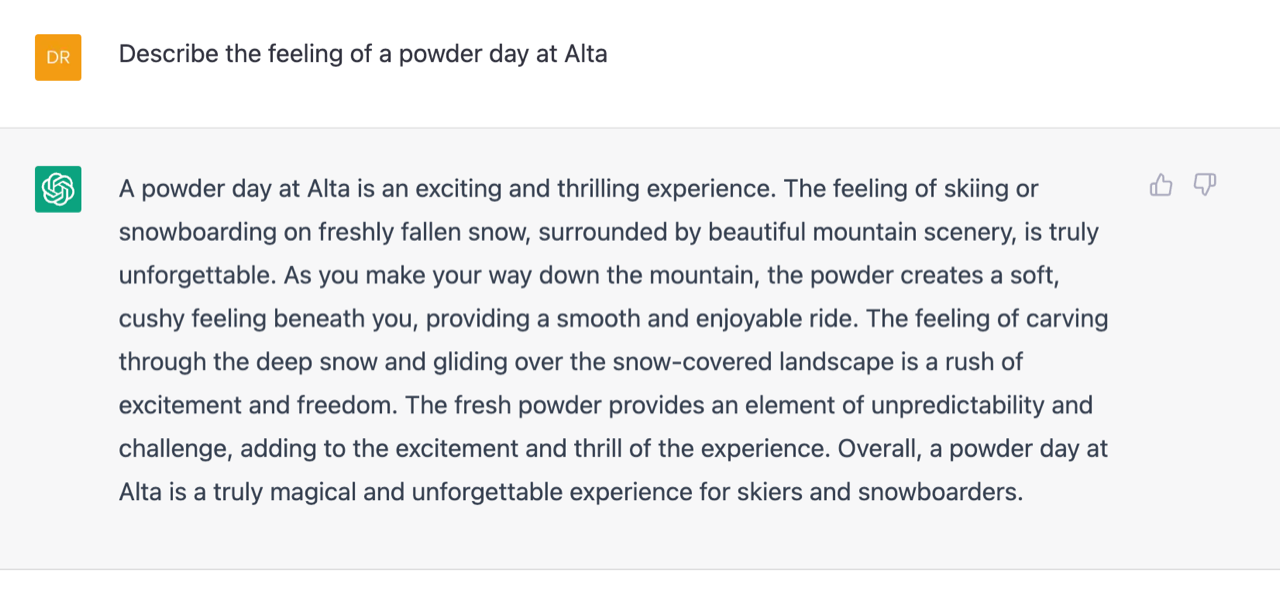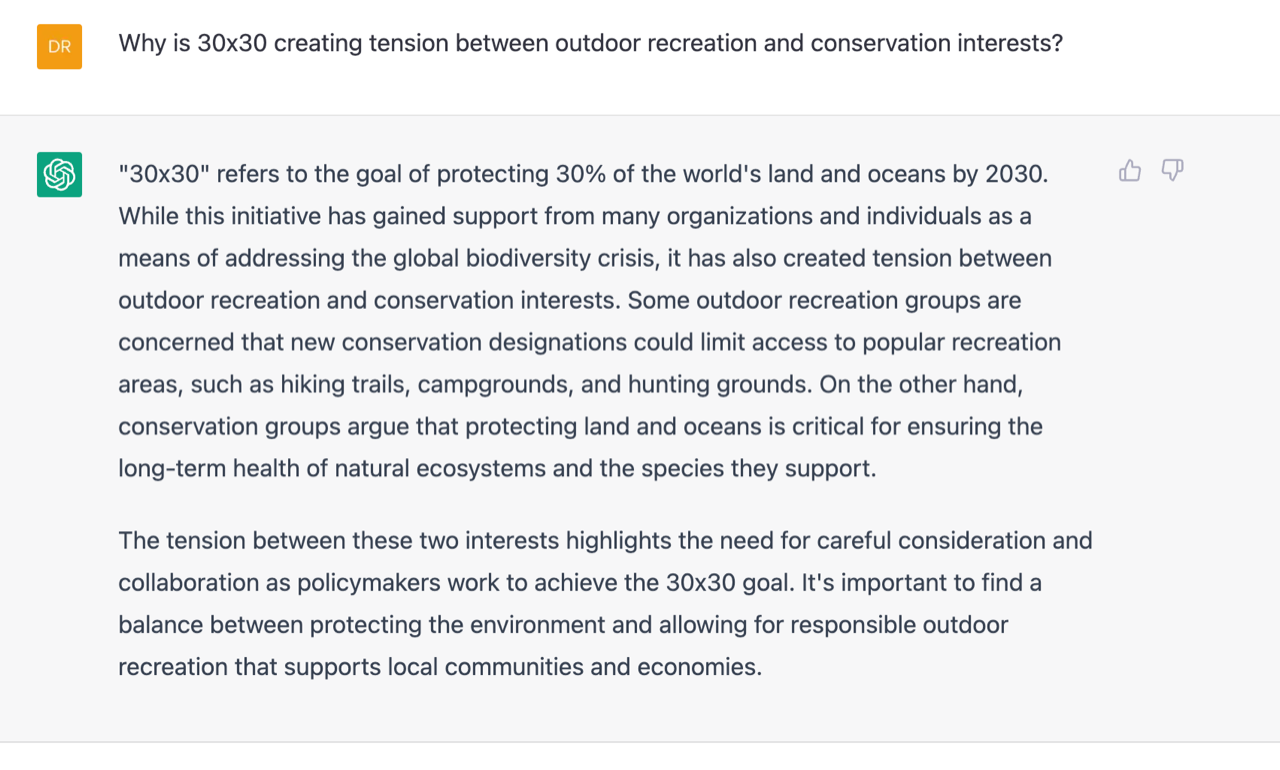Have you hugged your copywriter today? ChatGPT and the tragi-opportunity for outdoor writing
There are three types of outdoor writers. Those who have heard about ChatGPT, those who have tried it, and those who are doing their very best to stick their heads deep into the digital sand and not think about it.
The called ChatGPT was rolled out for public consumption in late November, and quickly made deserved waves as a robust new technology and a world-class disruptor with widespread applications in writing, marketing and plenty of other fields.
The super dumbed down explanation for ChatGPT is that it works the same way as the predictive text on your iPhone – you know, the one that guesses the next word based on the last one – with one big difference. It's connected to everything else on the Internet.
ChatGPT is simple to use, honestly kind of fun to explore, and feels largely like a new frontier. In hopes of crystallizing my own thoughts about ChatGPT, I created a batch of samples (images below) ranging from bland but awesome (“Explain the features and benefits of the Flylow Baker Bib in the style of Donald Trump”), to remarkably strong (“Why is 30x30 creating tension between outdoor recreation and conservation interests?” and “What are the pros and cons of a gondola in Little Cottonwood Canyon?”) to ones that ultimately miss the mark (“Describe the feeling of a powder day at Alta”).
If you’re looking for an amazingly fast and accurate tool that can bang out structured content with a level of quality somewhere between an instruction manual and an average student’s college essay, — and can also incorporate keywords or stats or whatever other factoids you want to drop in – then you’re going to go bananas for ChatGPT..
But, if you’re looking for something different, something unique, or something that sticks with you … well … these aren’t the droids you’re looking for.
In an excellent early January podcast on artificial intelligence, Ezra Klein of the New York Times explains that the big takeaway from ChatGPT is not that it will reduce the value of writing to zero, but that it will “reduce the value of bullshit writing to zero.” Because that’s what ChatGPT excels at: functional but hollow writing.
Or, to use the parlance of the outdoor world, it fails the authenticity test.
ChatGPT is not going to give you Mountain Gazette, or Adventure Journal, or The Drake. It’s not going to deliver a classic Jaded Local rant, or a deep dive into the economics of ski towns, or an Elwayville, let alone a “God of Skiing.”
Without a doubt, ChatGPT can crush your word count on literally any topic in a matter of seconds, but it’ll do it without passion or personality, snark or soul. And while it can zig, it definitely doesn’t zag.
I’m pretty sure it was John Irving, or maybe it was Bob Vila, who said that good writing is essentially carpentry. And for sure, that analogy clicks with ChatGPT. It’s a tool that can quickly and incredibly affordably slap up a foundation, some framing, and probably do the drywall and paint too. But it can’t design the house, or place it gracefully within the natural landscape, or do the essential finishing touches that make it a home.
More relevant to the community of communicators in the outdoor world, ChatGPT works more than well enough to have a massive negative impact on a generation of writers, particularly those tasked with busily filling up all corners of the Internet. No doubt, that community is starting to have the meat sweats about a very real loss of work on the horizon.
But having been lucky enough to work with, near and around writers for most of my life, I can vouch that this is a stubborn and resilient bunch. Writers write, that’s what they do, and regardless of where they are in their careers or whatever the shit sandwich was they had for lunch, they will always find a way.
There’s also a case to be made that many of these writers likely weren’t that psyched about the type of writing that is now going to be done by bots. They did the block-and-tackle fluff and the mind-numbing catalog blurbs for the paychecks, and to stay sharp, and to keep their options open for a chance to do the writing that they really love and want to do. And while certainly more than a few will bail and seek out a change of pace, maybe pull a few restaurant shifts or go back to fly shop, others will recognize that now is the time for them to double down.
One of the least written about challenges created by the digital transformation of the last 25 years is its significant role in isolating writers in silos. The fall of the newspaper and the extinction crisis among magazine titles hasn’t just been bad for readers and reading in general, it’s been incredibly brutal on the writers who’ve survived these early rounds of the J-School Hunger Games. They write from home now instead of the bullpen, hidden away in a Spartan office above the garage or a carved out desk space in the laundry room. Sure, they’ve got plenty of digital tools to get their work out into the world – blogs and substacks and oh-so-much social media. But the dream of doing quality stuff on a regular basis has also had to downsize.
I'm of the mind, probably because of my antiquated newspaper bones, that the best individual writing is the result of a team environment, which is at once an amazing and addictive and frustrating thing. The friendly competition, the real rivalries, the thrill of putting a published piece out into the world, the agony of putting something less than great out there, and all surrounded by a constant push to be better, all on deadline. It’s tough to make creative headway without a team, even with all the technological advances in the world. The Algonquin Roundtable doesn't happen as a Zoom call.
In my heart of hearts, I’m sincerely hopeful that from of the carnage of ChatGPT and the recent shuttering of way-too-many outdoor titles … that some of those silos will get blown away too, enabling new teams to form and write about new things in new ways.
There’s never been a better time to either write something worth reading, or ski something worth writing about.
###





